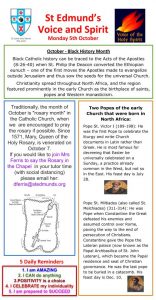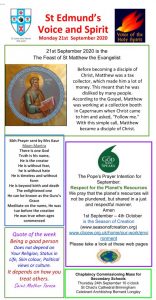
Today is the Feast Day of Saints-St Therese of Lisieux. If you ever get the chance to read about her she did simple acts of kindness and did everything with a smile. What a fantastic role model.
Please do not visit St Edmund’s Catholic Academy if you, or a member of your household, are showing signs of coronavirus.
We can be contacted on 019020 55888. Alternatively you can send us an email: enquiries@stedmunds.org
Thank you for keeping the St Edmund’s community safe.
Heidi Makes Express & Star Headlines: https://bit.ly/3kHv05u
A Wolverhampton family is on a mission to raise more than £16,000 to buy a 12-year-old girl a new wheelchair to help her enjoy trips to the beach and woodland.
More than £1,500 has already been raised for the Wheels For Heidi fundraiser. Visit uk.gofundme.com/f/wheels-for-heidi to donate.
Open Morning on Thursday 29 September has been cancelled to ensure the safety of the St Edmund’s community.
We apologise for any inconvenience caused and hope you will join our Virtual Open Evening on Thursday 8 October.
More information can be found on our website.
If your child, or a family member, has any of the main symptoms of COVID-19, a test should take place as soon as possible and, in accordance with Government guidance, your child and anyone they live with must stay at home and self isolate until the test result is received.
Do not send your child / children to school but do contact us if self isolation is taking place so attendance register can be updated.
If your child / children or a member of the household receives a negative test result it should be emailed to enquiries@stedmunds.org. A member of staff will contact you to confirm when your child / children can return to school.
If your child or someone in the family home tests positive for COVID-19, the household should self isolate for 10 days from the onset of symptoms. Everyone in the household who does not have any symptoms, must isolate at home for 14 days, or until the symptomatic household member receives a negative result.
Do not send your child / children to school but do contact us to agree an earliest date for a possible return.
Should your child receive a positive test result, you must contact St Edmund’s as a matter of urgency on 01902 558888.
More information on coronavirus symptoms and how to get a test is available on the NHS website:
https://www.nhs.uk/conditions/coronavirus-covid-19/symptoms/
Coronavirus self isolating chart is now on the website: https://bit.ly/2RQVvJp
All symptomatic persons (adults or children) should isolate for 10 days from the onset of symptoms and get a test as soon as possible.
Please inform the Academy of any test result.Should a pupil receive a negative test result, please contact the Academy.
No pupil should return to school after a negative test result without first contacting the Academy and being free of fever for at least 48 hours.
All household members, who do not have symptoms, should isolate for 14 days from the onset of symptoms in the symptomatic person. Should household members develop symptoms during this isolation period, they should also get a test.
Click her for more guidance on attendance relating to coronavirus:



